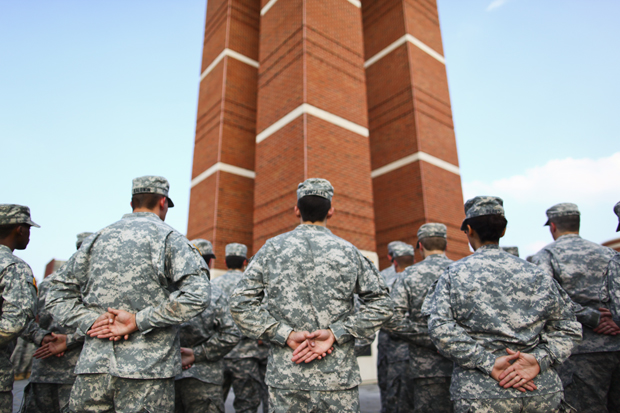Military Student Services grows to new heights
July 9, 2013
Teresa Jameson was a non-traditional military student a year ago trying to make her way through college like a traditional student. Jameson is one of approximately 2,500 military students who make up the student body at WKU.
Programs like the Military Student Services (MSS) at WKU aim to help these non-traditional military students like Jameson.
Much like they did for Jameson, a 14 year Air Force veteran, many of these programs like MSS fly under the radar for students with their services going untapped.
“The Textbooks for Troops program was brand new my first semester, so I didn’t know about it and bought my own textbooks,” Jameson said. “For someone that doesn’t have any money, that was a hard hit to take, but it was something I knew I had to do if I wanted to go back to college.”
‘Textbooks for Troops’ was created to provide free textbook loans to eligible military students. The program is now opening the opportunity for children and spouses of active duty, guard, reserve and veterans.
It’s opportunities like Textbooks for Troops that Jameson, who now is a student worker at the Veterans Resource Center in Tate Page Hall, says the MSS provides that every eligible student should take consider.
“When they learn about us, they’re excited because we offer a lot of benefits to not only them as the students, but their families,” Jameson said. “We will help you with anything we can, whether it’s a class, finding a job, or if you need to come in and talk, we’re here to listen.”
Sgt. 1st Class Chris Bradley from the Army National Guard ROTC said the program has changed the way many military students go about their college careers.
“It’s amazing the difference in what we used to do and what we do now,” Bradley said. “It’s amazing what that staff has done an amazing job with the Textbook for Troops and all the other programs they offer.”
Functioning the organization on private funds alone is a definite challenge according to MSS director Tonya Archey.
“It’s a struggle and a real challenge,” Archey said. “A lot of universities across the nation are in the same boat we are. They create the office of Military Student Services and the universities don’t really have a lot of money to put into the programs. So everything we’re doing, we’re going out to get donations for.”
MSS puts on events like benefit auctions to help raise money to add onto the donations it already receives. An auction is scheduled for December and items are currently being accepted by MSS.
“We’re hoping to raise several thousands of dollars to meet the growing demand for textbooks,” Archey said. “Until we can get funding from the university, we’re relying totally on donations.”
MSS is doing well with their donations with the expansion of the department to the fourth floor of Tate Page Hall. Where as the Veterans Resource Center currently consists of one room that holds a lounge area and a study section, the new room will house both areas separately and will be ready for the fall semester.
Along with resource space extension, MSS will add another staff member to the group, but not an ordinary at that.
CanDoo will be the new facility dog for the Veterans Resource Center from the Smoky Mountain Service Dogs. The dog will be able to detect if a military member is suffering from an episode of posttraumatic stress. Jameson said Candoo will travel with military students across campus that may need him.
“When CanDoo comes I’m going to take him to class so he can get used to the classroom environment,” Jameson said. “Once he is used to that if a veteran comes in and suffers from PTSD that needs CanDoo to go with him to a class, that’s what he’ll do.”
For Jameson, the opportunity that MSS has provided for her was unlike anything she ever thought she would experience in college, saying the program’s potential is extremely high.
“It gave me a little place to call home on campus,” Jameson said. “Being much older and a veteran and surrounded by freshman was a scary thought. But here, people can come in and talk to each other and that’s a good thing.
“I can only see this growing more.”



















![Students cheer for Senator at Large Jaden Marshall after being announced as the Intercultural Student Engagement Center Senator for the 24th Senate on Wednesday, April 17 in the Senate Chamber in DSU. Ive done everything in my power, Ive said it 100 times, to be for the students, Marshall said. So, not only to win, but to hear that reaction for me by the other students is just something that shows people actually care about me [and] really support me.](https://wkuherald.com/wp-content/uploads/2024/04/jadenmarshall-600x422.jpg)



